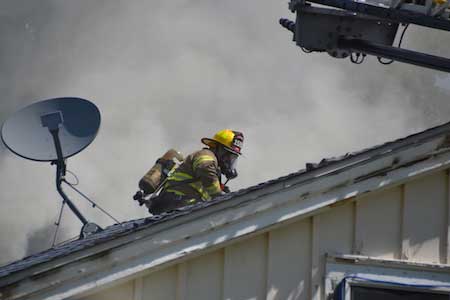Collins pleased funding for Firefighter Cancer Registry included in FY20 Appropriations Bill
Press Release, Congressman Chris Collins

Photo by Tom Rivers: A firefighter is on the roof of a house on Park Avenue in Medina today.
WASHINGTON, D.C. – Congressman Chris Collins (NY-27) applauds $2.5 million in funding for the Firefighter Cancer Registry Act included in the FY20 Labor, Health, Human Services, Education, and Related Agencies Appropriations bill.
“Eighteen years ago, we witnessed a horrible tragedy, yet we also witnessed the heroic actions of America’s brave first responders who went running towards the destruction while many were running away from it,” said Congressman Collins. “The Firefighter Cancer Registry is the first step in addressing the increased rate of cancer among firefighters due to the hazardous conditions when fighting fires. I applaud the Committee on Appropriations for recognizing how important this funding is to our first responders.”
The House Appropriations Committee originally appropriated $1.6 million in funding for the Firefighter Cancer Registry. Congressman Collins and Congressman Pascrell introduced an amendment providing an additional $900,000 to fully fund the authorized amount of $2.5 million. The amendment passed the House of Representatives by a vote of 413-10.
“It is essential that the registry receives full funding and be implemented to find links between fighting fires and the increased risk of cancer. I am proud to continue working with Representative Pascrell in introducing this amendment during the appropriations debate to protect these brave men and women who risk their lives every day,” added Collins.
The Firefighter Cancer Registry will improve collection capabilities and activities to address the enormous gap in research on the health impacts of cancer incidence among firefighters – career and volunteer. Firefighters may experience detrimental health effects due to smoke inhalation and other harmful, toxic substances. Funding for this registry is crucial to take the first steps towards gathering this information to develop new protocols, safeguards, and equipment to protect these men and women.





































































